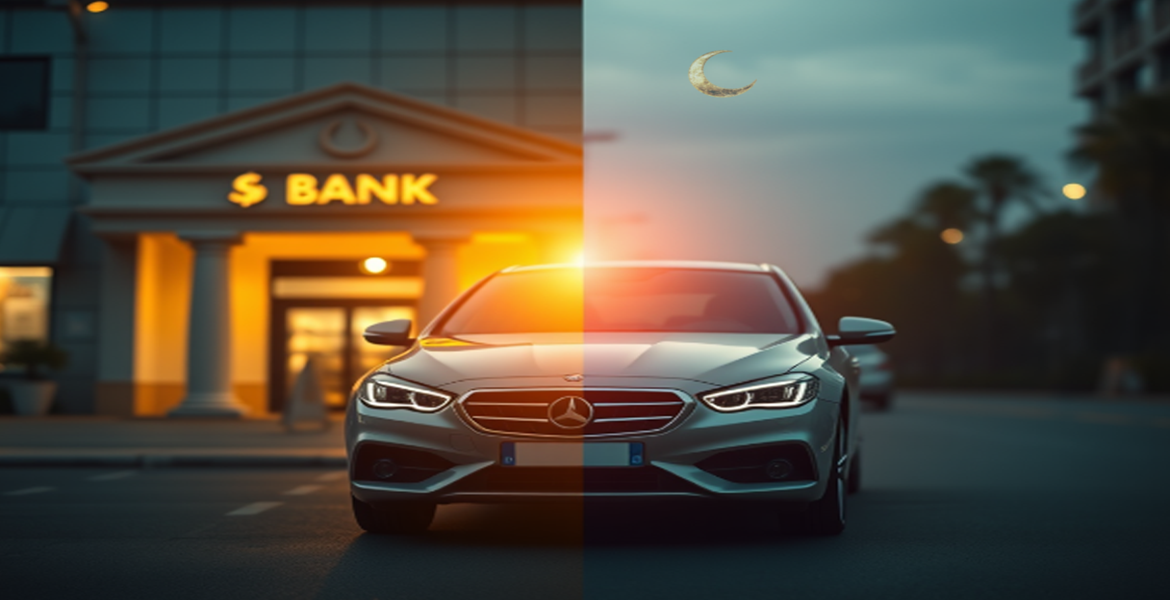
Is Islamic Car Finance Just Interest in Disguise?
- Post by: wp-islamicfinancereviewcouk
- April 19, 2025
- No Comment
Is Islamic Car Finance Just Interest in Disguise?
In an era where vehicle ownership is almost essential, car financing has become an integral financial service for individuals and families. Nonetheless, for Muslims committed to observing Islamic values, this decision goes beyond simple affordability. It touches on deeper ethical and spiritual concerns: Is the financing method halal? Does it involve interest (Riba)? Is it aligned with Shariah? These questions have led to the increasing demand for Islamic car financing. This article offers a detailed comparison of Islamic and conventional car financing. It clarifies misconceptions and presents global examples. It also addresses a frequently asked question — is Islamic car finance more expensive?
How Conventional Car Financing Works
Conventional car financing operates on the basis of lending money with interest. Customers typically choose between models like personal loans, hire purchase (HP), or personal contract purchase (PCP). In each of these, a financial institution either provides the funds. Alternatively, it retains ownership of the car until payments are complete. The lender earns profit by charging interest on the loaned amount, usually calculated as a percentage (APR) over time.
This structure is built on the principle that money has a time value, and the longer one borrows it, the more one must pay. This model is legally acceptable in many societies. However, it directly conflicts with Islamic law. Islamic law prohibits Riba, or interest, in all forms.
Why Interest (Riba) Is Prohibited in Islam
Islam’s economic ethics centre around justice, transparency, and balance. Riba is considered inherently exploitative because it ensures a guaranteed return for the lender, regardless of the borrower’s circumstances.
Some key references include:
“Allah has permitted trade and forbidden Riba.”
(Qur’an, Surah Al-Baqarah, 2:275)
“The one who consumes Riba, the one who pays it, the one who records it, and the two witnesses to it are all cursed by Allah.”
(Sahih Muslim, Hadith 1598)
The distinction here is critical. Islam permits trade where both parties bear risk. The outcome in such trade is uncertain. However, Islam prohibits lending money with a guaranteed gain (interest). In this case, only the borrower bears risk.
Understanding Murabaha and Ijara: Islamic Car Financing Models
Islamic car financing is structured through asset-backed, Shariah-compliant contracts that avoid interest. Two commonly used models are Murabaha and Ijara.
In Murabaha, the Islamic bank purchases the vehicle and sells it to the customer at an agreed profit margin. This is not interest — it’s a disclosed markup in a sale transaction. The total repayment is fixed and agreed at the outset, offering transparency and predictability.
In Ijara, the bank leases the vehicle to the customer for a fixed rental amount. The bank retains ownership during the lease, and the customer may purchase the vehicle at the end for a nominal price. As the bank owns the car during the lease period, it also bears certain risks — which is a key difference from interest-based loans.
In both models, profit is generated through real asset transactions rather than the use of money alone.
📎 Real-World Examples:
- Al Rayan Bank (UK) – Offers Murabaha-based vehicle finance with FCA regulation: alrayanbank.co.uk
- Meezan Bank (Pakistan) – Offers Ijara-based “Car Ijarah” plans: meezanbank.com
- Emirates Islamic (UAE) – Offers Ijara auto finance with Shariah board supervision: emiratesislamic.ae
Is Islamic Finance Really More Expensive?
This is one of the most common and valid concerns — and the honest answer is: sometimes, yes. Islamic car finance can be slightly more expensive than conventional finance, especially in Western markets.
Why is that?
- Operational structure: Islamic banks must take ownership of the vehicle before reselling or leasing it. This requirement adds administrative and legal cost.
- Shariah compliance: There is a cost associated with ongoing Shariah board reviews and certifications.
- Risk assumption: Especially in Ijara, banks bear certain risks of ownership (insurance gaps, taxes, etc.).
- Smaller market share: Islamic banks often lack the volume discounts or economies of scale available to major high-street lenders.
🔢 Comparative Example (Based on April 2025 Data):
According to Moneyfacts UK, April 2025, the average APR on conventional car loans in the UK was 6.5%.
Meanwhile, Al Rayan Bank’s Murabaha vehicle finance offered a typical markup equivalent to around 7–8.5% APR in cost terms, depending on vehicle value and duration.
So:
- Conventional loan: £20,000 over 5 years at 6.5% APR → £22,645 total repayable
- Islamic Murabaha: £20,000 vehicle sold for £23,000 over 5 years → £355 more in cost
Despite the slightly higher total, many Muslim consumers accept this as a cost of ethical compliance. They view it as a necessary investment in financial integrity.
What About Conventional Asset-Based Loans Like HP and PCP?
It is important to note that some conventional car finance models include Hire Purchase (HP) and Personal Contract Purchase (PCP). These models are “asset-based” because the car serves as security. Ownership may transfer after the final payment. This raises a common misconception: are these not similar to Murabaha or Ijara?
The answer lies in the underlying contract. While HP and PCP use the car as collateral, the profit is still earned through interest on the loaned capital. These contracts are loan-based, not sale-based or lease-based. The return to the lender is not tied to any real trade or asset ownership. It is linked to the mere lending of money. This remains impermissible in Islamic law.
In contrast, Islamic finance requires the bank to own and sell or lease the asset. This process transfers risk and responsibility. The bank earns profit through legitimate trade.
Case Study: Ahmed’s Ethical Choice
Ahmed, a professional living in London, needed to finance a new £16,000 car. He compared a 6.5% APR personal loan from a mainstream UK bank with a Murabaha agreement from Al Rayan Bank. The conventional option would have cost him about £17,380 over four years. The Islamic option totalled around £17,620. This was about £240 more. Despite the difference, Ahmed chose the halal option. He stated that his peace of mind and adherence to Islamic principles were far more valuable than a modest saving.
Islamic Car Finance Across the Globe
Islamic car finance is expanding steadily across various regions. In Malaysia, Maybank Islamic offers both Murabaha and Ijara options tailored to local consumer needs. In Pakistan, Meezan Bank’s “Car Ijarah” is a leading product. In the UAE, Dubai Islamic Bank and Emirates Islamic have well-developed Ijara-based auto finance systems. And in South Africa, Al Baraka Bank provides halal vehicle finance under strict Shariah compliance.
Even in non-Muslim majority countries like the UK, demand for Islamic car finance is rising. Providers like Al Rayan Bank and Rizq are making these services more accessible through digital platforms.
Practical Advice for Faith-Conscious Buyers
For Muslims considering car finance, it is crucial to verify the nature of the contract. Always ask whether the provider is using a Murabaha or Ijara model. Confirm whether they are regulated and certified by a Shariah board. Carefully review the total repayment amount. Look beyond just the monthly instalment. Ensure the contract clearly avoids compound interest or undisclosed fees. When possible, deal with FCA-regulated Islamic banks for additional consumer protection and transparency.
Final Thoughts
Islamic car financing is not simply a rebranding of interest-based models. It is a fundamentally different, ethically grounded system rooted in ownership, transparency, and spiritual accountability. It may be marginally more expensive in some cases. That cost reflects the bank’s risk, operational duties, and commitment to halal structures. For Muslims who prioritise faith in every aspect of their lives, Islamic car finance provides a meaningful alternative. It is a compliant option to conventional loans for those considering financial decisions.
At Islamic Finance Review (IFR), we are committed to breaking down the complexities of Islamic finance. We guide readers toward responsible, halal financial choices for today and for the Hereafter.
